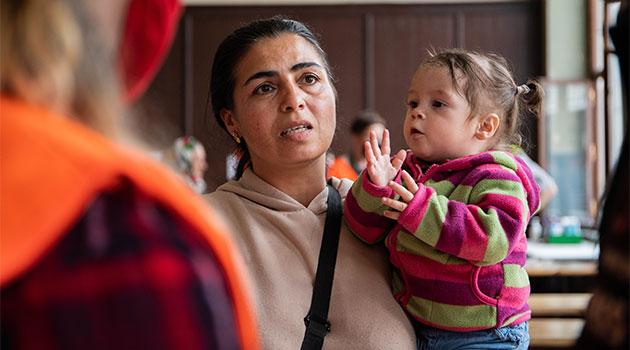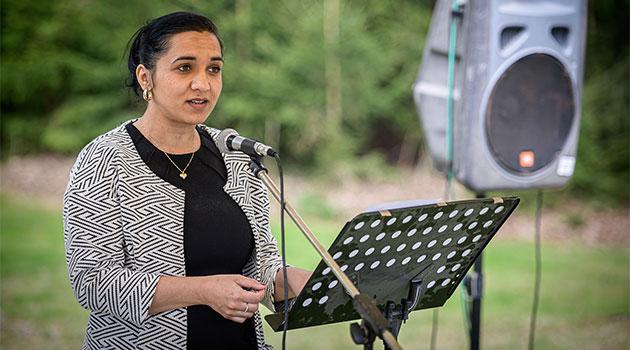Czech civic initiative calls for aid and demands systemic solution after assistance to Romani refugees from Ukraine collapses altogether

When it comes to aiding the refugees from Russia’s war on Ukraine in the Czech Republic, the situation at the main train station in Prague has long been unsustainable and Romani refugees are finding the assistance system restrictive, undignified and unfair. That is the message of a statement released yesterday by Initiativa Hlavák (Main Station Initiative), volunteers from which have been helping refugees since the beginning of the Russian invasion of Ukraine.
“Closing down our aid at the station would be pointless. However, we cannot work for much longer as we are working now. We don’t have resources, the clients are suffering, the volunteers are quitting and no wonder. Systemic change in the assistance for Romani refugees from Ukraine is necessary. It’s never going to work otherwise,” reads the statement, which news server Romea.cz is publishing here in full.
Statement by Initiativa Hlavák (Main Station Initiative) on the current humanitarian crisis at Hlavní nádraží (the Main Train Station in Prague, Czech Republic)
The Main Station Initiative has been helping people who are fleeing to safety for seven years; during that time, the form of our volunteer work has transformed, but we have always been here for people who, for various reasons, have fallen through the cracks in the system. Currently, we feel that the way in which our Initiative is being forced to function is incorrect.
We do not agree with the conditions in which the refugees are being forced to rot away at the train station, and we are aware how the current functioning of the system is restrictive. Coordinators and volunteers across our Inititative realize that we have become part of a restrictive, undignified, unfair system.
However, we also perceive that if we were to stop working there, then even the basic, urgent aid we can offer to these people fleeing to safety would no longer be available. From the beginning of the war in Ukraine, it was clear that the Czech Republic was now in an historical situation that is unprecedented, and that a huge number of people would be arriving here.
Together with the Organization for Aid to Refugees (OPU), the firefighters who work for the railways, medics from the 3rd Faculty of Medicine in Prague, the Railway Administration and the Czech Police, we created a refugee center that is ready to provide comprehensive assistance, from help with train tickets to legal assistance for people in specific situations. Everything functions thanks to hundreds of volunteers who are taking care of the aid and operations.
In the first days of the war, our Initiative handled as many as 7 000 refugees from Ukraine daily and successfully. A lot has changed since then, though.
From the beginning, our role was focused around the information stands set up by the City Council of Prague, and was designed primarily as delivering basic information and aiding the refugees with navigating their arrivals, supplemented with the opportunity to arrange emergency overnight stays, basic food assistance or help from the medics. At the moment, however, our shifts do not involve information provision, but rather dealing with the humanitarian crisis at the station itself.
Hundreds of refugees from Ukraine whose conditions for living here are undignified, who are still in need of aid, and who have nowhere else to go are returning to the main station. Currently the situation there is becoming more and more demanding each and every and has long been unsustainable.
We are incapable of providing adequate, dignified aid to the people fleeing to safety. Basic assistance from the institutions of the state could make it adequate and dignified, but that is what we do not have.
There is more than one reason for this: One is food shortage. The rations there are set up on the basis of the assumption that individual refugees will come, get their strength back, and then continue on to the Regional Assistance Centers where they will get care.
Unfortunately, that is not happening. For many reasons, right now people (usually Romani families) are returning to us from the Regional Assistance Centers without having been housed and without having received more support, and they have nowhere else to go than to us.
This means the new arrivals and the returnees have to share the limited rations we have at the main train station. In addition to the amount of the food, its ingredients are a problem – from a nutritional standpoint it was never designed to be a daily diet one can live on.
Although OPU is repeatedly, urgently reporting this to the Crisis Team at the Czech Government and to many other committees and meetings, no aid is arriving from the state to solve this problem. So far, their concerns about the nutrition for the refugees have just manifested themselves in the restriction that for health reasons, we have been forbidden to give out coffee to those fleeing to safety.
Another reason things are inadequate and undignified are the opportunities to sleep at the train station. Those are limited and we do not have the capacity to arrange even the most basic lodging for the night for all of the refugees there.
Our services at the station were never designed to include providing long-term overnight accommodation and are by no means a dignified replacement for housing. There are just 70 beds in the hall that has been provided for this purpose by the Railway Administration.
These are places for the absolutely most vulnerable, usually nursing mothers and pregnant women. Up to 210 more people are also able to sleep on the seats of a parked train.
During our normal operations, that train is frequently completely overcrowded, it is not a dignified or a sustainable way to spend the night and it is definitely not suitable for long-term living; however, even those capacities are often completely filled. It is a common occurrence now for entire families to have no choice but to sleep on the cold floor of the station.
On Saturday, 7 May 2022, more than 400 people had no choice but to spend the night at the main station in Prague; during the month of April at least 3 807 people were forced to sleep at the main train station at some point. It is necessary that these people get into the refugee aid system.
These hundreds of human beings currently spending their nights at the main train station are predominantly Romani families. In their attempts to seek temporary protection they face, among other matters, the suspicion that they are citizens of Hungary (due to the foreign policy of Hungarian Prime Minister Viktor Orbán, a large part of the Hungarian-speaking citizens of the countries adjacent to Hungary have dual citizenship).
It takes as long as 10 days to verify these refugees’ identification, and there is no support given to them by the Czech state during that time. No hostel or any other space is available to them besides the main train station, and it is therefore understandable that all refugees in such situations come back here.
At the same time, refugees are returning to the train station who have left the accommodation allocated to them by the state. Here it is necessary to add that one of the few existing opportunities for long-term accommodation that the Czech state is providing to Romani families with many members are detention centers, the character of which is quite close to that of a custodial prison.
The refugees’ choice to leave such housing is, from a human perspective, quite understandable. A significant segment of our current clientele is also formed by people who, for different reasons, were never afforded the opportunity to apply for temporary protection (again, Romani families, usually), or people who were not allowed to enter Germany and have returned to Prague.
No accommodation on an emergency basis and no aid with their legal and social situations is being provided by the state in a systematic way to any of these groups, it is the Main Station in Prague, at the moment, that is shouldering all responsibility for them. In Brno, in Pardubice and in other cities, these people are sleeping on the streets.
Political pressures exist here not to aid certain refugees. We are in the runup to local elections, and rescuing hundreds of impoverished Romani refugees will not score anybody political points if there is no guarantee their basic needs will be met and no prospects of their being accommodated or incorporated into their new places of residence.
Providing aid at the main station in Prague will always be necessary during refugee crises. Equivalents to our services are being provided in the cities to which refugees are fleeing around the globe.
The current situation, when instead of running information stands and aiding refugees with navigating the system, we are serving to inadequately patch up a humanitarian crisis that could have almost absolutely been prevented through solutions that are systemic, is exhausting and over a longer term it is undignified and unsustainable. Closing down our aid at the station would be pointless.
However, we cannot work for much longer as we are working now. We don’t have resources, the clients are suffering, the volunteers are quitting and it is no wonder.
Systemic change in the assistance for Romani refugees from Ukraine is necessary. It’s never going to work otherwise.
